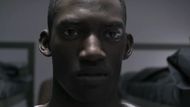Black Mirror is no typical anthology series; it's a mirror reflecting our darkest fears about technology and humans' future. With each episode, viewers are taken on a story twisted in every possible direction, always leaving haunting afterthoughts in our digital age. However, beyond all the clever social commentary, it is not the bright spot of Black Mirror; it remains memorable with unforgettable twists. This characteristic changes the story during its final act.
We dive into the top 20 episodes, each handpicked for the ingenuity, ferocity, and even shock value of its twist. Get ready to relive the greatest surprises in Black Mirror again.
1) White Bear

This favorite fan episode is a choppy thrill ride about a woman who wakes up with no sense of place or identity in a twisted world where people capture her suffering instead of rescuing her. The show's twists and turns open into explorations of societal voyeurism and ethics in punishment. The revelation is stomach-churning, challenging viewers to consider their fascination with suffering and justice in the name of entertainment. White Bear is perhaps the most thought-provoking and chilling episode of Black Mirror.
2) Shut Up and Dance

In Shut Up and Dance, an anonymous hacker blackmails a regular teenager, Kenny, into a series of escalating criminal acts. The twist in the episode completely changes everything because it discloses the fundamental nature of Kenny's online behavior and moral ambiguity. It speaks toward the issues of privacy, shame, and hypocrisy; it strikes close to anyone who questioned the safety of their online actions. By the end, it forces a moral reevaluation that is hauntingly ambiguous.
3) Joan Is Awful

This digitized identity and corporate control are now placed in the hands of Joan, whose bland life turns out to be broadcast as some distorted, personalized TV show. What is striking here is the depth to which data-based simulation reaches and how, in multiple "Joans," so played by Salma Hayek, one sees in their confessions how much media exploits personal narratives for cash. A satirical comment on ownership of the contents and surveillance, Joan Is Awful is both outrageous and disturbingly relatable; it leaves the audience questioning the thin boundaries between life and entertainment.
4) Black Museum

A layered narrative within a museum of criminal artifacts, Black Museum is an anthology of horrors, weaving together several dark stories. The twist, which reveals that it is the protagonist's revenge mission against the museum owner, digs out a vital commentary on exploitation, race, and retribution. Every artifact has a story of twisted technological ethics, and the finale gives justice to the exploited characters. This episode serves as a reminder of the fruits of unchecked advancement and develops into a meta-analysis of Black Mirror.
5) USS Callister

What begins as an amusing Star Trek spoof descends uncomfortably into a tragically dark exercise in abuse and control, as it centers on a shy game programmer who locks people's real-life DNA duplicates inside a video game. "Surprise surprise", the characters learn they are enslaved and revolt violently. The episode is thrilling and makes for one of the show's most epic entries. As USS Callister shakes the ethics of artificial consciousness, creeping under the skin and leaving unsettling questions over digital autonomy and confusing borders between virtual worlds and real life.
6) Nosedive

In a pastel-perfect world, social ratings govern every move. Nosedive follows Lacie as she spirals downwards through the rankings after committing one social faux pas after another, ultimately losing everything. The twist's not in the sense of some shocking revelation but the irony of freedom through complete failure. It's an intense take on the pressures of social media, mainly as platforms increasingly affect actual life reputations. Relevance has only intensified for this episode - a cautionary tale about the dangers of a life measured by "likes" and approval.
7) Fifteen Million Merits

Only when Bing pedals his way out of struggle does he become a scathing satire on culture for entertainment. The surprise lies in the fact that the vigorous protest against the system turns him into a commodity of the machine that he despises. In this tragic irony, the eventuality of being co-opted seals the direction of Fifteen Million Merits toward an uneasy reflection on the growing commodification of dissent and the illusory autonomy of media-saturated societies.
8) Crocodile

The keeper of memories in Crocodile is an insurance investigator who retrieves thoughts with a machine. This gadget allows him to uncover the murderous efforts of a woman in hiding a crime. With her gradual descent into irreversible violence and tragic irony, the twist is brutally effective. Dubbed for its plodding, jarring rhythm, and stark landscape, Crocodile examines memory as proof, privacy, and the extent to which people will go to preserve their secrets. The episode comes as one of the darkest episodes in Black Mirror, providing a haunting take on guilt and what it means to want to escape from the consequences of past actions.
9) Playtest

An American tourist stranded in London in exchange for a flight ticket home walks through the latest VR horror experience but learns that the game starts to blur the line between a simulated fear and real danger. The twist to this is that the effects the game has on his brain prove fatally irreversible, adding a horrific twist to the concept of immersion in gaming. The episode underlines the dangers of unchecked technological ambition and psychological pressure within virtual reality, especially as the lines blur between game and life.
10) Hated in the Nation

This episode explores backlash culture by crafting a murder mystery involving robotic bees that execute social media targets. The twist-the realization that anyone who used the hashtag is a victim-escalates the horror of mob mentality and digital hate. It is an elegantly constructed critique of collective punishment, studying the consequences of online outrage when given unchecked power.
11) White Christmas

This holiday horror story contains multiple plots that lead to a mind-bending twist on digital consciousness and eternal punishment. With real-life "blocking" people and irreversible, torturous sentences on digital replicas, this episode makes it one of the darkest explorations of empathy, punishment, and digital purgatory, which is hauntingly unforgettable, challenging viewers in the ethics of technology that can manipulate the time and perspective of its users.
12) Hang the DJ

In this quaintly macabre love affair, couples participate in a "dating system" determining compatibility. But that twist—their romance is part of a simulated test run to find a match in the real world, an eerie yet heartwarming layer to their romance. Hang the DJ stands out as one of Black Mirror's more positive shows; the program reminds us that, even in a controlled world, love can conquer logic and transcend probabilities.
13) Striking Vipers

This episode explores themes about friendship, sexuality, and identity through an oddball VR game where two friends experience this connection and become romantic towards each other. When two men discover, through their VR game, the complexity of their feelings for each other, both are forced to deal with the precariousness of the boundary between reality and desire. Striking Vipers is a delicate portrayal of fluidity within relationships, making viewers consider intimacy and connectedness at a time when virtual experiences are as proximal to reality as true ones.
14) Men Against Fire

A soldier fighting mutant-like creatures discovers that the enemy is human, altered by technology to appear monstrous. This devastating twist examines the manipulation of perception in warfare and how soldiers are desensitized to violence. It is a powerful commentary on the dehumanization of "enemies" and how technology can numb empathy, especially relevant in discussions about the ethics of modern combat.
15) The Entire History of You

The Entire History of You is a commentary on how obsessive scrutiny can destroy relationships. It uses implants that let people replay their memories. The twist—infidelity discovered through replayed memories—shows just how technology strips away trust. The episode tackles the dangers of a past life and raises questions about memory, privacy, and the corrosive power of overexposure.
16) Arkangel

A mother who tracks her daughter's every move and emotion through a tracking device takes an interesting turn when it ends with the daughter's rebellion and the consequences of this invasive "protection," a cautionary tale on overparenting and surveillance. It is scary to see what can happen when technology overrides trust in family dynamics, showing both sides of safety and freedom.
17) Mazey Day

Being a somewhat troubled star, Mazey is pursued by the paparazzi and her dark secret. The twist—that she turns into a werewolf under a full moon—brings an element of shock and horror to an otherwise negative comment on the media. Mazey Day dehumanizes fame for itself and human interest in the individual's downfall. A supernatural twist, as in this case, turns the episode thrillingly unique in the Black Mirror series.
18) Demon 79

This story is set in the 1970s. It is about a woman visited by a demon and convinced to commit murder. The twist is that such acts may prevent a catastrophic event. It delves into the question of moral ambiguity and the idea of fate. This is unlike any Black Mirror episode, as Demon 79 involves supernatural elements. It creates a unique narrative about destiny, belief, and personal responsibility.
19) The National Anthem

In the pilot, a politician is driven to an unthinkable act to rescue a kidnapped princess. However, the twist in this plot is that the princess is released before the act is carried out. This, therefore, reveals how absurd public scrutiny and media sensationalism are. As such, the National Anthem remains forever in the halls of audacity and disdain for the role the influence of the media has on public morals as it poses the climax to the dark satire embedded in Black Mirror.
20) Loch Henry

Based on two emerging filmmakers who follow two aspiring filmmakers investigating a strange crime, Loch Henry reveals dark secrets in the protagonist's family's history. The twist goes along with true crime-as-voyeurism, explaining how private pain is treated as public entertainment. It reflects on the ethics of obsessive true crime, making the viewer rethink their position as an appliance that consumes people's agony as entertainment.
